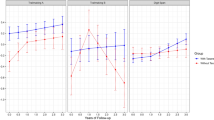Summary
Purpose
This longitudinal prospective study describes the older breast cancer patient’s perception of the cognitive impact of adjuvant chemotherapy.
Methods
A total of 50 patients ≥age 65 with stage I to III breast cancer enrolled in this IRB-approved prospective study. Of the 50, 3 refused postchemotherapy testing and 2 had a cerebrovascular accident (CVA) during therapy, leaving 45 evaluable patients. The Squire Memory Self-Rating Questionnaire, given before and 6 months after chemotherapy, measured patients’ perceptions of the ability to learn new information, of working memory, and of remote learning capabilities.
Results
Mean age was 70 years (range 65–84). Breast cancer stages were: I (33%), II (64%), III (2%). A 51% (23/45) of study participants perceived a decline in memory from before to 6 months after completion of chemotherapy. Patients who perceived a poorer memory than average before chemotherapy were more likely to report further memory deterioration after chemotherapy (19/30, 63%) than patients who perceived that their memory was average or better than average prior to chemotherapy (4/15, 27%). The memory domain most likely to be perceived as affected was the ability to learn new information (22/45, 49%) compared to remote memory (9/45, 20%) or working memory (13/45, 29%) capabilities.
Conclusion
Approximately half of these older women perceived a decline in cognitive function from before to 6 months after chemotherapy. This perceived decline in cognitive function was most pronounced in patients with preexisting memory complaints. Further prospective study is needed to confirm these observations, correlate perceived memory changes with objective findings, and identify subgroups at special risk.
Similar content being viewed by others
References
Early Breast Cancer Trialists’ Collaborative Group (EBCTCG). Effects of chemotherapy and hormonal therapy for early breast cancer on recurrence and 15-year survival: an overview of the randomised trials. Lancet, 365 (9472): 1687–1717, 2005
Wefel JS, Lenzi R, Theriault RL, Davis RN, Meyers CA The cognitive sequelae of standard-dose adjuvant chemotherapy in women with breast carcinoma: results of a prospective, randomized, longitudinal trial Cancer 100:2292–2299, (2004)
Ahles TA, Saykin AJ, Furstenberg CT, et al. Neuropsychologic impact of standard-dose systemic chemotherapy in long-term survivors of breast cancer and lymphoma J Clin Oncol 20:485–493, (2002)
Brezden CB, Phillips K, Abdolell M, et al. Cognitive function in breast cancer patients receiving adjuvant chemotherapy JCO 18 (14):2695–2701, (2000)
Schagen SB, Van Dam F, Muller MJ, et al. Cognitive deficits after postoperative adjuvant chemotherapy for breast carcinoma Cancer 85 (3): 640–650, (1999)
Van Dam FSAM, Schagen SB, Muller MJ, et al. Impairment of cognitive function in women receiving adjuvant treatment for high risk breast cancer: high dose versus standard dose chemotherapy J Natl Cancer Inst 90(3):210–218, (1998)
Shilling V, Jenkins V, Morris R, Deutsch G, Bloomfield D The effects of adjuvant chemotherapy on cognition in women with breast cancer – preliminary results of an observation longitudinal study The Breast 14:142–150, (2005)
Squire LR, Wetzel CD, Slater PC Memory complaints after electroconvulsive therapy: assessment with a new self-rating instrument Biol Psychiatry 14(5):791–801, (1979)
Fried TR, Bradley EH, Towle VR, et al. Understanding the treatment preferences of seriously ill patients N Engl J Med 346:1061–6, (2002)
Yellen SB, Cella DF, Leslie WT Age and clinical decision making in oncology patients J Natl Cancer Inst 86:1766–70, (1994)
Eagles JM, Beattie JAG, Restall DB, et al. Relationship between cognitive impairment and early death in the elderly Br Med J 300:239–240, (1990)
Wolfson C, Wolfson DB, Asgharian M, et al. A reevaluation of the duration of survival after the onset of dementia New Engl J Med 344: 1111–16, (2001)
Saykin AJ, Janssen R, Sprehn G, et al. Longitudinal evaluation of neuropsychological function in homosexual men with HIV-1 infection: 18 month follow-up J Neuropsychiatry Clin Neurosci 3: 286–298, (1991)
Deutsch GK, Saykin AJ, Sperling MR Metamemory in temporal lobe epilepsy assessment 3:255–263, (1996)
McAllister TW, Flashman LA, Sparling MB, et al. Relationship of psychopathology to post-concussive symptoms one month after mild traumatic brain injury J Neuropsychiatry Clin Neurosci 11:150–151, (1999)
Acknowledgement
This work was supported by Dr. Hurria’s American Society of Clinical Oncology Young Investigator Award, K23 AG026749-01: Paul Beeson Career Development Award in Aging Research, and ASCO Career Development Award. The authors wish to thank Carol Pearce for her assistance in the preparation of this manuscript.
Author information
Authors and Affiliations
Corresponding author
Rights and permissions
About this article
Cite this article
Hurria, A., Goldfarb, S., Rosen, C. et al. Effect of adjuvant breast cancer chemotherapy on cognitive function from the older patient’s perspective. Breast Cancer Res Treat 98, 343–348 (2006). https://doi.org/10.1007/s10549-006-9171-6
Received:
Accepted:
Published:
Issue Date:
DOI: https://doi.org/10.1007/s10549-006-9171-6



